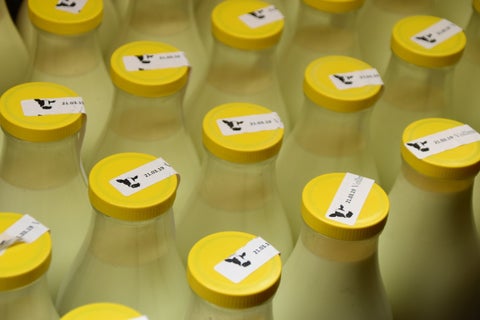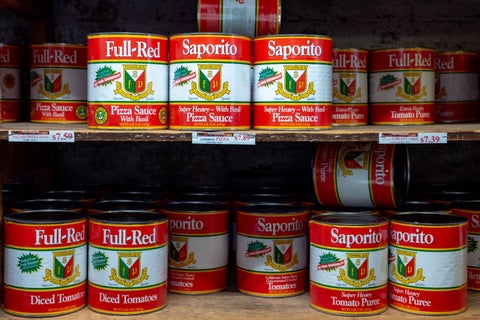Do Expiration Dates Matter? How CPGs Can Keep Their Customers Safe
There are 2 types of people in this world: those who won’t touch food as soon as it hits the expiration date and those who will give it a quick sniff and assure you that it's fine, 4 days past the ‘best before’.
Regardless of your personal beliefs around expiration dates, as manufacturers of food or beverage consumer packaged goods (CPGs), it’s in your best interests to read up on food product dating.
Surprisingly enough, it’s not the federal law for CPGs to display dates on food products - unless it’s infant formula.
It may not always be compulsory, but the last thing you want is a customer complaining that your product has given them an upset stomach. A lack of expiration date may also deter some wary customers from buying your product.
All of your need-to-knows are covered below.

The Most Common Types of food expiration dates
Have you ever wondered why different products use different terminology? What’s the difference between ‘Best Before’ and ‘Use By’?
There aren’t any strict, uniform descriptions for food dating in the States, hence the variety. Let’s kill some of the confusion.
Best If Used By/Before
The BB date is more of a recommendation to customers for when they’ll get the best out of the food or beverage product. If you were to drink a soda 5 days after the best before, you might not be experiencing its flavor to the fullest.
Born On
A rarer date label that has reemerged mainly in the beer industry. It’s the date at which the (beer) product was manufactured. The reason it’s mainly used for beer is that the sun can affect the taste. You’ve got roughly three months to drink up!
Expiration date
The date after which a consumable product is no longer fit for consumption - whether in terms of damage, spoiling or ineffectiveness.
Guaranteed Fresh
The ‘Best Before’ of baked goods. Again, it’s more of a recommendation for the customer. If you eat the bakery item while it’s within the Guaranteed Fresh date, then it’s…guaranteed to be fresh. Pretty self-explanatory.
Pack
Typically found on packaged or canned goods. It’s usually written in code, but we’ll help you crack it. It might be a number in the MMDDYY format, but sometimes manufacturers like to make it extra complicated by using the Julian calendar. We won’t go into too much detail, but January would be 001-0031 and December would be 334-365.
Sell By
This date indicates to the store or retailer at which date they should cease selling a product. This date is more to do with the manufacturer ensuring that their customers only experience fresh, good quality products, rather than being at risk of spoiling. It will likely still be safe to eat for the following days.
Use By
This date is set by the manufacturer for the consumer. Despite the ring of urgency to this date label, it’s still just a recommendation. It’s usually the last date at which the product will be at its best.
For instance, you might want to include a Use By date on a birthday cake - no one wants stale baked goods on their big day, right?
All these terms can be confusing to the consumer and it can result in a lot of food waste from those who are wary of eating food past whatever date is displayed on their product.
The Food Safety Inspection Service (FSIS) therefore suggests using a Best If Used By/Before date. Research has shown that consumers tend to recognize that food is still safe to consume after this date.
How long will foods last and how should they be stored?
We may joke around about sniffing foods and checking for mold to see if it’s okay to eat, but this is actually what the FSIS from the United States Department of Agriculture (USDA) recommends.
They say that spoiling will be ‘evident’ in terms of an ‘off’ smell, taste or look. If it gets to this point, it’s probably not safe to eat or drink.
You’ll want your customers to get the most out of your product, so it’s a good idea to include clear storage instructions on your packaging right where they can be seen easily.
Ok, let’s look at some key food products

Milk
Can last up to a week beyond the Sell By date! Look out for lumps and a sour taste or smell. Make sure that your customers know to keep it refrigerated below 40 °F with the cap screwed tightly on to ensure that it keeps for as long as possible.
‘Once opened, consume within 3 days’ is a common one here.
Eggs
Should be fine for 3 - 5 weeks. In the United States, eggs should be kept in the coldest part of the refrigerator. They shouldn’t be stored in the door as this area can warm up due to repeated opening of the door.
Poultry and seafood
Make sure to advise cooking or freezing within a day or two of purchasing.
Once frozen, the foods will be safe beyond the expiration date. You could mention this on the packaging so that your customers don’t mistakenly throw it in the trash.
Beef
Can be cooked or frozen 3 - 5 days beyond the date of purchase.

Canned foods
Depending on the contents, they can last anywhere between a year to five years. Fingers crossed your customers won’t wait 5 years before sampling your product!
Safe storage and distribution
Before your products even make it to your customers’ homes, you’ll need to store and transport your goods in the proper ways to prolong their shelf lives.
Every item will have unique storage and transportation requirements that will need to be followed strictly for your customers to get the most out of them.
Buffalo Market specializes in distribution of CPG products that are good for the planet and good for people.
We deliver premium frozen, refrigerated, and dry products to retailers every day of the week.
Get in touch to find out more!


